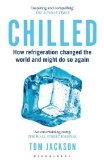Summary | Excerpt | Reviews | Beyond the book | Read-Alikes | Genres & Themes | Author Bio

From Netscape to the iPhone
by Brian McCulloughHistories of the Internet often start with the origin story of ARPANET – a Cold-War era communications project – and then proceed to the technology changes that followed. However, in Brian McCullough's How the Internet Happened: From Netscape to the iPhone, technology doesn't take center stage. McCullough says, "This is not a history of the Internet itself, but rather, a history of the Internet Era...when computers and technology itself stopped being esoteric and started becoming vital and indispensable." McCullough doesn't spend time on nodes and protocols. Instead, he tells the human side of the Internet story, the blind rush toward the next big thing and the rapid successes and failures along the way.
The opening chapter focuses on what McCullough terms "The Big Bang" that ignited the Internet era – the launch of the startup Netscape, and with it one of the earliest web browsers. "Netscape would not define the Internet Era – or even survive it – but it was the first of its kind, and in many ways it was the template for all the people and companies that would follow." In this chapter, we see the origins of the web browser through Netscape visionary Marc Andreessen. We follow Andreessen as he codes Mosaic, the first widely used web browser, with fellow students on the University of Illinois campus. Andreessen is "built large, at six feet two, with a loud, excitable personality," and despite being just a part-time student programmer, "he had an anti-authoritarian, independent streak that his peers came to appreciate." While Andreessen recognized the potential for the web, the computer science community at the time seemed to be putting effort into making the programs difficult to use, "to keep the riff-raff out." Andreesen wanted just the opposite. He wanted the web "to look as sexy as it felt to people like him...[he] wanted to add pictures."
The book jacket describes the book as "rollicking," and it certainly is fun to read. At various points I found myself remembering "where I was when," whether I was using AltaVista, installing a freebie AOL CD on my dad's PC, or otherwise experiencing this shared history. The book is chronological; each chapter has an arc in its own niche, and the chapters overlay and weave together, giving a holistic sense of the tumultuous change that was everywhere at once. The chapters connect well, too, despite being somewhat standalone narratives. Chapter 1 concludes with Marc Andreessen taking a jab at Bill Gates and Microsoft in an InfoWorld interview, while Chapter 2 is all about the rise of Microsoft's competing browser, Internet Explorer.
Each chapter features individuals or small groups of visionaries, startups or investors. After the advent of the web browser, there are chapters on America Online (AOL), early web advertising, Yahoo, Amazon, and the race to get really big, really fast. McCullough moves us through the "Dot-Com Era" and the "Dot-Com Bubble," showing the steps, missteps and drama as the bubble burst. The second half of the book covers the aftermath of the burst, known as the "Nuclear Winter," then moves on to Google, Napster, iTunes and Neflix. This period would come to be known as Web 2.0, and it was defined by more active user participation – such as blogging, uploading videos to YouTube or editing Wikipedia – as opposed to merely "surfing." In the final chapters he tells the story of social technology, featuring Facebook, and the rise of mobile with Palm, Blackberry and the iPhone.
Steve Jobs of Apple, Mark Zuckerberg of Facebook, Larry Page of Google and Marc Andreessen of Netscape are all featured prominently, as they should be. But many other figures are given dimension in McCullough's telling as well. One is Peter Thiel, who founded PayPal and went on to become the first major investor in Facebook. Another is Sean Parker, whom McCullough describes as someone who "virtually embodied the web's zeitgeist." He enters the story as the business mind behind Napster and reemerges later as a mentor to Mark Zuckerberg and an early board member of what was then named "Thefacebook."
McCullough describes the Internet era as being "about great technologies and disruptions and entrepreneurs." Through his lens, though, it also feels like a larger force was at play – as though after the seismic disruption he calls the Big Bang, everyone scrambled but no one knew what would be around the next corner. Perfect timing as well as innovation and savvy business decisions were required. Of course, in addition to those who managed to make all the right moves, there were many other product concepts and startups that we've never heard of, and others who believed they had more control over their destiny (and market share) than they really did. Interestingly, when Larry Page and fellow inventor Sergey Brin approached Yahoo and other search engines to license their new PageRank algorithm – the breakthrough math behind Google – no one was interested.
The ability of everyday people to access the web through web browsers like Mosaic and Netscape Navigator in the early nineties represented a profound change, opening wide the possibility of a reordered world. From there, a riveting and fast-paced story of innovation and high stakes investment unfolds. This well-researched and well-curated history provides just the right amount of detail to keep the reader engaged and connected to the stories of those most closely involved, showing the various ways their ideas shaped our experience of the Internet.
![]() This review
first ran in the November 14, 2018
issue of BookBrowse Recommends.
This review
first ran in the November 14, 2018
issue of BookBrowse Recommends.

If you liked How the Internet Happened, try these:

by Jamie Ducharme
Published 2022
A propulsive, eye-opening work of reporting, chronicling the rise of Juul and the birth of a new addiction.

by Tom Jackson
Published 2016
The refrigerator may seem mundane nowadays, but it is one of the wonders of twentieth-century science - lifesaver, food preserver, social liberator.
Your guide toexceptional books
BookBrowse seeks out and recommends the best in contemporary fiction and nonfiction—books that not only engage and entertain but also deepen our understanding of ourselves and the world around us.